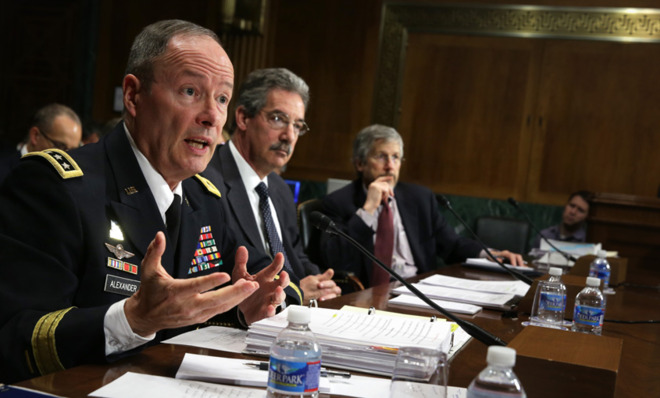Why the courts are the NSA's biggest enemy
With Edward Snowden's leaks out in the open, courts could begin to chip away at the government's collection of metadata


A federal judge on Monday ruled that the National Security Agency's bulk collection of Americans' phone records is likely unconstitutional.
Judge Richard Leon of the U.S. District Court for the District of Columbia found that the program, disclosed by former NSA contractor turned secret-spilling international fugitive Edward Snowden was "almost Orwellian" and appeared to violate the Fourth Amendment's protection against unreasonable search and seizure.
However, he stayed his ruling pending a government appeal.
The Week
Escape your echo chamber. Get the facts behind the news, plus analysis from multiple perspectives.

Sign up for The Week's Free Newsletters
From our morning news briefing to a weekly Good News Newsletter, get the best of The Week delivered directly to your inbox.
From our morning news briefing to a weekly Good News Newsletter, get the best of The Week delivered directly to your inbox.
"I cannot imagine a more 'indiscriminate' and 'arbitrary invasion' than this systematic and high-tech collection and retention of personal data on virtually every single citizen for purposes of querying it and analyzing it without judicial approval," he wrote.
Leon's ruling is a scathing rebuke to the Obama administration, which has continued the controversial phone records collection program begun under the auspices of President George W. Bush. And it's the first major legal blow to a program that proponents have defended by claiming that "every judge" to review it has deemed it constitutional. Until now, that is.
Indeed, judges on the secretive Foreign Intelligence Surveillance Court have repeatedly approved the data collection program. And Congress, too, has backed it virtually unanimously.
That means the most likely challenge to the program was always going to come from the regular court system.
A free daily email with the biggest news stories of the day – and the best features from TheWeek.com
That's where Leon's ruling comes in. Though he did not definitively call the program unconstitutional, he repeatedly noted that the plaintiffs had a "substantial likelihood" of proving as much, and predicted that future court rulings would bear out his argument.
There are a handful of similar cases pending in federal courts, including one brought by the American Civil Liberties Union, that attack the program as unconstitutional prima facie.
The oft-cited legal underpinning of the phone records program is a 1979 Supreme Court case, Smith v. Maryland, which held that police could place a "pen register" — a type of phone monitor — on a suspect's phone without first obtaining a warrant. In conjunction, the government has defended the collection of phone records under Section 215 of the Patriot Act. The so-called business records provision permits the collection of "any tangible thing" from a company so long as it's relevant to an "investigation to protect against international terrorism."
In 2006, the NSA, under Bush, convinced the FISA court to issue a secret order agreeing that Section 215 could be used to obtain phone data on virtually anyone. The ruling "essentially gave the NSA authority to place a pen register on everyone's phone," wrote The New Yorker's Ryan Lizza in an exhaustive story on the agency's spying authority, and was thus "a nearly complete victory for the agency."
Addressing the Smith case, Judge Leon swatted down the White House's broad interpretation for three main reasons.
First, he noted that the NSA is collecting information on not one specific person, but on millions of people. Second, the program, rather than taking place during a brief time window, could theoretically go on forever. As a result, Leon wrote that the NSA had essentially roped communications companies into a "joint intelligence-gathering operation with the government," which was much different from police checking a few days' worth of phone records on one suspect.
On a third crucial, if perhaps obvious, front, Leon wrote that the Smith ruling was woefully outdated, rendered obsolete by "technological advances and a cellphone-centric lifestyle heretofore inconceivable."
"When do present-day circumstances — the evolutions in the government's surveillance capabilities, citizens' phone habits, and the relationship between the NSA and telecom companies — become so thoroughly unlike those considered by the Supreme Court 34 years ago that a precedent like Smith simply does not apply?" he wrote. "The answer unfortunately for the government, is now."
Though the ruling did not have an immediate, tangible impact on government surveillance, it could have a ripple effect on future rulings that ultimately weakens the program. Past challenges to the NSA's actions have been dismissed for lack of standing: Plaintiffs have been unable to prove they were impacted by secret programs, and thus prevented from mounting challenges in the first place. Leon argued that they no longer should be.
In February, the Supreme Court threw out a legal challenge from the ACLU and others to the NSA's warrantless wiretapping for that very reason. But that was before the Snowden leaks revealed the NSA was collecting information on pretty much everyone. Leon wrote that Snowden's disclosures about the full extent of the NSA's snooping resolved that question of standing, clearing the way for future litigation to advance past that old stumbling block.
The White House, for its part, has maintained the program is completely legal.
"We've seen the opinion and are studying it," the Justice Department said in a terse statement. "We believe the program is constitutional as previous judges have found."
But now, for the first time, one has not. It may be only a matter of time before a court definitively strikes down the program, as it is currently constructed.
Jon Terbush is an associate editor at TheWeek.com covering politics, sports, and other things he finds interesting. He has previously written for Talking Points Memo, Raw Story, and Business Insider.
-
 Bari Weiss’ ‘60 Minutes’ scandal is about more than one report
Bari Weiss’ ‘60 Minutes’ scandal is about more than one reportIN THE SPOTLIGHT By blocking an approved segment on a controversial prison holding US deportees in El Salvador, the editor-in-chief of CBS News has become the main story
-
 Has Zohran Mamdani shown the Democrats how to win again?
Has Zohran Mamdani shown the Democrats how to win again?Today’s Big Question New York City mayoral election touted as victory for left-wing populists but moderate centrist wins elsewhere present more complex path for Democratic Party
-
 Millions turn out for anti-Trump ‘No Kings’ rallies
Millions turn out for anti-Trump ‘No Kings’ ralliesSpeed Read An estimated 7 million people participated, 2 million more than at the first ‘No Kings’ protest in June
-
 Ghislaine Maxwell: angling for a Trump pardon
Ghislaine Maxwell: angling for a Trump pardonTalking Point Convicted sex trafficker's testimony could shed new light on president's links to Jeffrey Epstein
-
 The last words and final moments of 40 presidents
The last words and final moments of 40 presidentsThe Explainer Some are eloquent quotes worthy of the holders of the highest office in the nation, and others... aren't
-
 The JFK files: the truth at last?
The JFK files: the truth at last?In The Spotlight More than 64,000 previously classified documents relating the 1963 assassination of John F. Kennedy have been released by the Trump administration
-
 'Seriously, not literally': how should the world take Donald Trump?
'Seriously, not literally': how should the world take Donald Trump?Today's big question White House rhetoric and reality look likely to become increasingly blurred
-
 Will Trump's 'madman' strategy pay off?
Will Trump's 'madman' strategy pay off?Today's Big Question Incoming US president likes to seem unpredictable but, this time round, world leaders could be wise to his playbook


